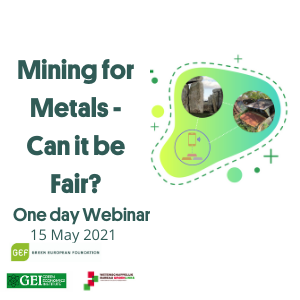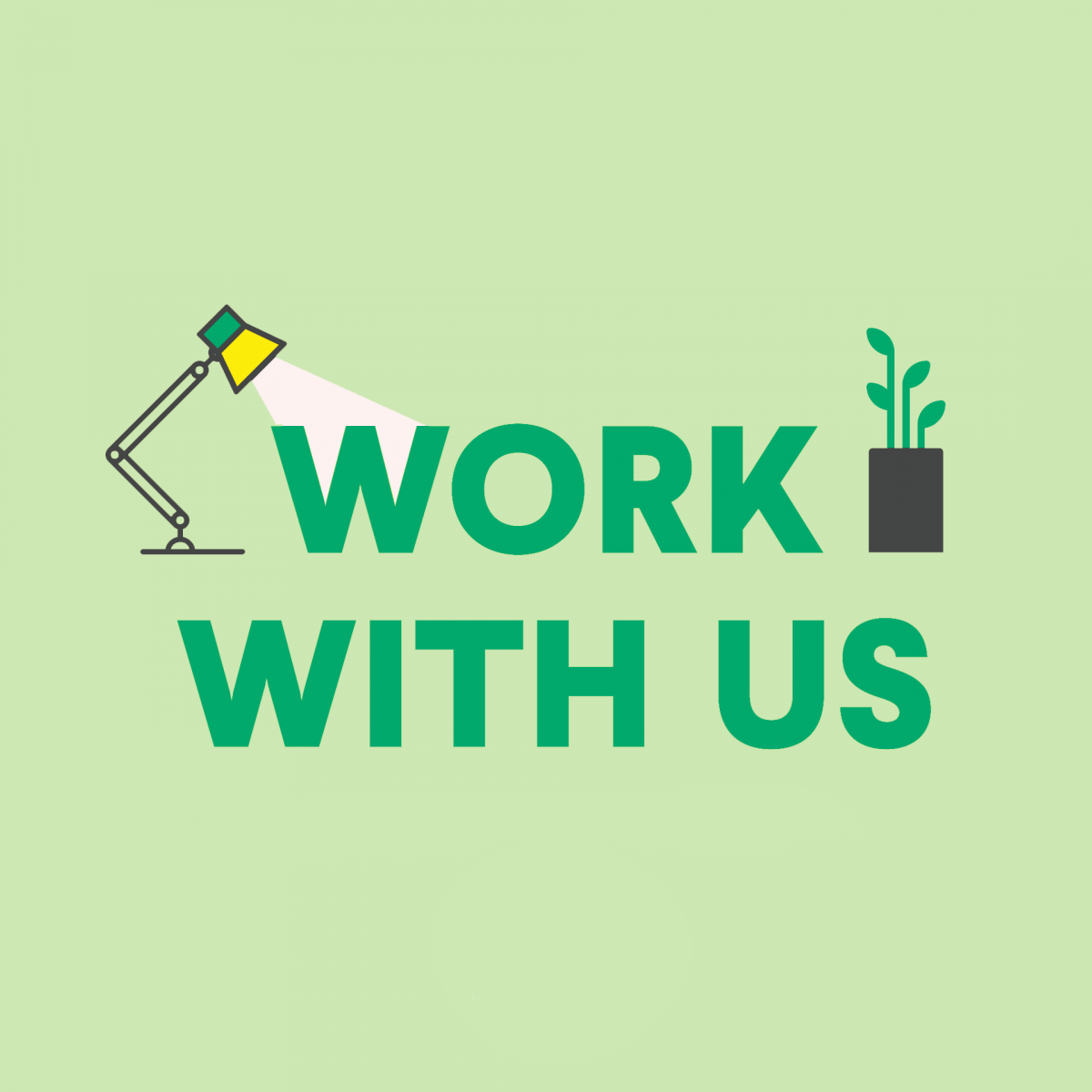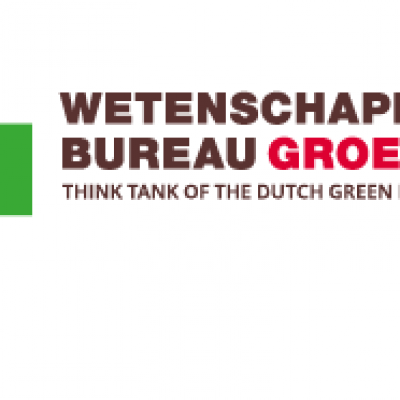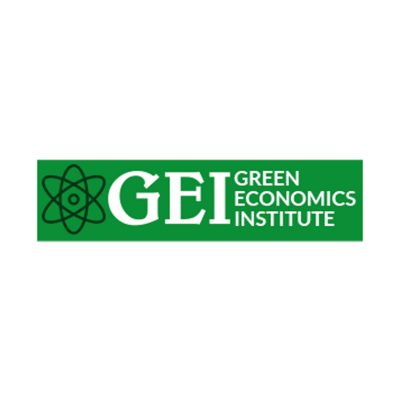
- This event has passed.
Mining for metals – can it be fair?
2021

Europe’s energy and digital transitions depend on metals from the Global South. All too often, mining is dirty business, wreaking havoc on ecosystems and local communities. Can Europe source the metals it needs in a responsible way?
About the Event:
The energy transition has been placed at the top of the European political agenda, with the digital transition closely following suit. But to successfully implement these two priorities, the EU needs to examine and adjust its supply and use of metals.
Should we press mining companies to clean up their act and negotiate a fair trade in metals, or is time to nearshore the extraction of metal ores? Is it even possible for Europe or the UK to become self-sufficient in metals, by reviving metal mining within their borders and/or by drastically improving recycling from the urban mine? One thing is clear: the dilemmas around metals make it all the more urgent to rethink our consumption patterns, from mobility to data use.
This is the third of nine public webinars as part of the project ”Metals for a green and digital Europe” organised by GEF with the support of Wetenschappelijk Bureau GroenLinks (Lead partner), Green Economics Institute, Institute for Active Citizenship, Etopia, Transición Verde, Visio, Fundacja Strefa Zieleni.
Speakers:
Miriam Kennet (The Green Economics Institute, UK ) – Director CEO
Richard Wouters (Wetenschappelijk Bureau GroenLinks, NL) – Metals for a green and digital Europe project leader
Francisco Ruiz and Mark Driver- (Mining in Chile)
Dr Freddie Tshibumbu Shamwana ( DRC)
Sophie Kwizera – Just Transition, Actionaid (NL)
Karen Alvarenga Windham-Bellord, (UK and Brazil) PhD Cantab,Natural Resrouces Law specialist, Doctor of Philosophy from the University of Cambridge
Agneta Granstroem Indigenous Sami and former MP, (Sweden)
Dr Liliana Poposkova- Macedonia Former MP and specialist in Mining
Professor Peter Yang- USA and China- Renewable Energy. Case University
Michael Oghia from the Sustainable Digital Infrastructure Alliance.
Kim Than (University of Alberta, Canada)
Dr Enkhbaya Shagdar, Erina- (Japan) Senior Research Fellow and COP Climate Expert specialist in energy issues and sustainable development
Baroness Natalie Bennett- UK House of Lords
Coal Mining-Speaker- Ewa Sufin –
Professor Asia Mohammed IPBES (Sudan)
To be confirmed:
Dr Hend Ahmed Saldedin (Egypt) Steel Economics and mining and the environment.
Programme:
9.30-10.00 CEST Introduction
Presentation of the Green European Foundation’s transnational project Metals for a green and digital Europe by project leader Richard Wouters (Wetenschappelijk Bureau GroenLinks, NL).
10.00 -11.20 Session 1 – Mining in the Global South
A) Overview: The extraction of metal ores often causes major damage to nature and the environment, as well as human rights violations, conflicts and corruption.Examples include DRC and Chile. The mining of cobalt and coltan in the Democratic Republic of Congo (DRC) is a case at hand. Is a more responsible sourcing of metals from developing countries possible? Is the European Union on the right track by extending mandatory due diligence in supply chains?
Speaker: Sophie Kwizera – Just Transition, Actionaid (NL)Confirmed,
A) The situation in Africa and the DRC
Speaker: Dr Freddie Tshibumbu Shamwana ( DRC), Confirmed
B) Mining in Latin America
1)Mining in Chile- Speaker: Francisco Ruiz (Chile) Mining in Chile ,Confirmed
2) Stakeholder participation in dam safety plans in the mining sector-
Speaker: Karen Alvarenga Windham-Bellord, (UK and Brazil) PhD Cantab,Natural Resrouces Law specialist, Doctor of Philosophy from the University of Cambridge, . GEI Author and Editor. Confirmed-
She says”“The United Nations’ Awareness and Preparedness for Emergencies at Local Level (APELL) for the mining sector sets a 10-step plan for drafting and implementing actions with stakeholders’ participation at its centre. The APELL places special emphasis on representatives of local communities, making the plan more inclusive and effective in saving lives and the environment. This is because when people participate in the decision-making process from an early stage, they are more likely to implement what is planned. In times of emergency, knowledge of the plan and the will to follow it are crucial to save lives and minimize negative consequences of accidents.”
C) Discussion scene setting and Q and A (20minutes)
11.20-11.30 Short Break
11.30- 12.45 CEST Session 2 – Fair trade in metals: The Situation in Europe : Speaker Debate Panel.
Chair Professor Simon Mouatt, Co-Chair Ewa Sufin, Tech: Marlyn Hughes: Tech Miriam Kennet
The EU is eager to strengthen its industry for energy and digital technology, for
instance by building battery factories. If a developing country restricts the export of
metal ores in because it wants to make and export semi-finished metal products
instead, that might lead to a WTO complaint by the EU, as happened in the case of
Indonesia. Does the EU’s scramble for metal ores undermine the global South’s right
to earn more from their raw materials by building their own industry around it? What
would a fair trade arrangement look like?
A) -Mining in Europe: –
Cases
1) Dr Krzysztof Dudek a presentation on the mining of metals in Poland, especially copper. (Poland)
2) The just transition in Poland -Coal Mining-Speaker GEI UN COP Delegate Ewa Sufin -(Poland)
3) Mining conflicts in Norway- Hans Kare Flo- (Tekna-Technical Trade Union, Norway)
11.55-12.05 Mid session quick break
4) N Macedonia. Speaker: Liljana Popovska (N. Macedonia), Former MP and specialist in Mining, GEI Author.
5) Mining in Serbia: Zaklina Zivkovic, PolEkol (Serbia)
6) Indigenous Perspectives -Mining in Traditional SAMI areas in Sweden
Speaker- Agneta Granstroem Indigenous Sami Gov Councillor and Former MP (Sweden)
Q and A
12.45-13.00 Short Break
B) 13.00-13.15 Exploiting the urban mine
To what extent can a better recycling of metals reduce the need for virgin metals? At
present, it is the rarest metals that are worst recycled. How much research and what
kind of legislation do we need to fully exploit the urban mine? Can some metals that
are critical for green energy and digitalisation, such as the rare earths that we
currently source from China, be substituted by more common materials?
Speaker:
Dr Liljana Popovska-( N Macedonia )Former MP and specialist in Mining. ‘Liljana Popovska: Mining can not be in the neighbourhood of agriculture and tourism, definitely.’
13.00-13.30 CEST Lunch Break and Break Outs
13.30-14.20 Session 2d) Mining and The SDGs
The UN Sustainable Development Goals, impacts and ethics of mining -near shoring -can we justify bringing mining effects into the EU? If not- what is the alternative? (All speakers invited to be confirmed)
14.20-14.30 Short Break
14.30- 15.30 Session 3 –Contemporary Metal mining
A) 14.30-15.15 CEST : By importing most of their metals, both the European Union and the UK shift the burden of environmental damage to poorer countries. Mining in Europe would
probably be less destructive because of our environmental rules. Moreover,
perpetuating Europe’s dependence on metal imports, especially from China, creates
geopolitical risks. Is it time to revive metal mining within Europe’s borders? On what
conditions would that be acceptable to local communities and green activists, if at
all?
B) Sustainable digitalisation 15.10-15.30 20 minutes
Digital technologies can help us make a more sparing use of natural resources – from smart energy grids to sensors and algorithms that sort out metal scrap. However, not all forms of digitalisation are a blessing to the environment. The exploding use of data for online video, gaming, advertising, surveillance and training artificial intelligence requires more and more energy and metals. How can we put the digital transition on a sustainable path?
15.30- 15.45 – CEST Break
15.45 – 16.45 Session 4 –From Glasgow COP21 to Kunmin COP15 – 2021 a watershed year. The importance of mining and how to incorporate its future as a sustainable part of human activity.
At the end of 2021, the global community hopes to gather for the UN Biodiversity onference (COP15) in Kunming, China, and for the UN Climate Change Conference (COP26) in Glasgow, UK. If the coronavirus crisis has not driven home the urgency of protecting natural habitats and respecting planetary boundaries, then what will? However, whereas metal mining might be seen as a curse for biodiversity in Kunming, it may be seen as a blessing for climate solutions in Glasgow. Where metal mining takes place in the remaining habitats of wildlife, the risk of new zoonoses is lurking. But we cannot do without metals for carbon-free energy. How to reconcile the objectives of Kunming and Glasgow?
16.45 -17.00 CEST Break
17.00- 17.45 CEST Session 5–Concluding session- and next steps. Rethinking our hunger for metals
The dilemmas around metals prompt us to question a western way of life that is
consuming more and more kilowatt-hours and megabytes. Should we replace every
fossil fuel car with an electric one, or is it better to share cars and promote cycling?
Can our growing data consumption be justified and do we need an even more
versatile smartphone every two years? Are our politicians willing to confront these
questions, even if it might spook their voters?
Practicalities:
Date and time: Saturday, May 15th from 09:00 to 18:00 CET
Audience: This webinar will be in English and is open to the general public.
Registration: Click Here
Please note all times are Central European Time for this event.
This event is organised by the Green European Foundation with the support of Green Economics Institute and with the financial support of the European Parliament to the Green European Foundation.




